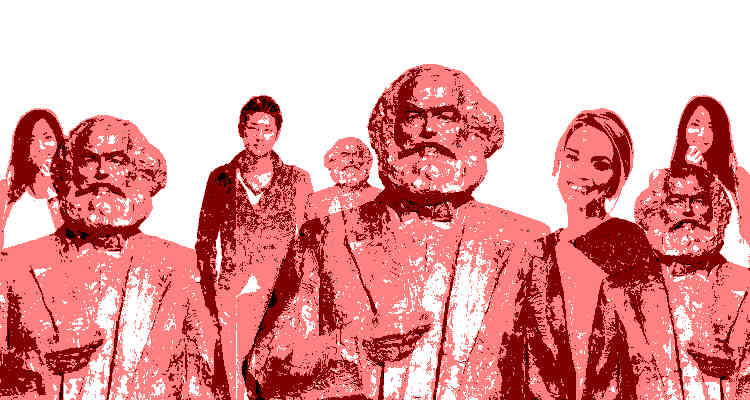When christians start to call each other names and create unnecessary division, it’s time to take notice. And take action.
Politics – the new denominationalism?
When I was growing up, denominationalism was a big thing. Catholic vs Protestant was the main divide. And each Protestant denomination had its own culture and emphasis that was a little tribal.
I thought it was a scandal at the time (based on 1 Corinthians 1-3), so I was pleased to see denominationalism slowly erode during my lifetime. Even Catholics and Protestants see each other more as brothers and sisters than as enemies these days (mostly).
So I am extremely saddened to see a new political divisiveness entering western christianity.
For it seems some of the biggest divisions in western christianity are not necessarily theological, but between political and social conservatives and progressives.
Signs of the times
Once was, more liberal christians took an interest in social justice and hence politics, but more conservative christians kept their distance. Christian faith was all about saving souls and keeping them safe, social justice was a distraction and politics was a dirty business.
But half a lifetime ago, things started to change. In the US, as outlined in this excellent article, the christian right took off. Being passionate about “family values”, and becoming concerned about the growth in secular culture, evangelical christians could be easily persuaded that conservative values such as opposition to abortion, homosexuality and the sexual revolution, should for the basis of their voting.
The Moral Majority may have been born partly out of a wish to protect some areas of racial discrimination, but family values soon became the catchcry. From President Reagan onwards, evangelical christians and conservative Catholics voted Republican and used political muscle to gain outcomes they wanted.
In Australia and Great Britain, christian culture didn’t shift so far or so fast, but slowly many conservative christians took up the same ideas. Evangelism and salvation were the highest priority and Jesus’ teachings on caring for the poor, on non-violence, and on proper respect for women, were seen as less important, sometimes called the “social gospel”. Paradoxically, abortion and homosexuality were not seen as social gospel, and so retained their importance to conservative christians.
Meanwhile, the less conservative christians hadn’t gone away
Progressive christians (i.e. less conservative and liberal) were running in a different direction. In the sixties and seventies christians like Ronald Sider and Jim Wallace started pointing out the social evils of inequality and injustice.
Later, progressive christians started to see their christianity in terms of Jesus’ main message, the kingdom of God, and not just personal salvation.
A feature of this kingdom is God’s concern, shown right through the Bible, for the poor and marginalised, for widows and orphans. Progressive christians applied this concern to care for the environment, for minorities, for racism and sexism, for indigenous peoples and refugees, and for the poor and deprived and powerless.
Two tribes
And so two tribes were born. Both christian, at least in name, but highly polarised on social issues, and thus polarised on how they voted too.
Of course all this is generalisation, and there are many evangelicals, especially black Americans, who are progressive, and many christians who remain in the middle ground.
But polarisation is clearly a feature of modern day western christianity. It is sad to say, but conservative christian nationalists have more in common with secular Qanon and atheist MAGAs than with progressive christians. Likewise, progressive christians can feel more at home with secular activists than with conservative christians.
At least, that’s how it often feel to me. (More on this later.)
The politics of demonisation
Psychologists seem to generally accept that we humans are not as logical as we’d like to think. Our decisions are most often made intuitively, often subconsciously.
An intellectual or knowledge-based commitment is not generally as strong as an emotional commitment. Smart politicians and advertisers know this, and they play on it.
Watch the TV advertisements for products like Coca Cola and you’ll see they are selling the emotions of being cool or popular or at the forefront, not factual information about the product. The advertisers know we’re more likely to spend money if we feel emotionally drawn to a product, if we feel that makes us part of a tribe, “our tribe”.
Politicians have learnt the same trick. Setting out thoughtful policy is boring. Making a politician seem like a saviour and their party seem like a wonderful “going places” tribe will win many more votes.
This was perhaps the genius of Donald Trump. He won his first election and almost won his second on a platform of almost meaningless phrases (“make America great again”, “drain the swamp”, etc), but a promise to give his followers back something they felt they had lost. He and they were a big tribe fighting everyone else for the heart and soul of their country.
Of course it helps if you can demonise your opponents. The blacker you can paint them, the more fervent will be your followers. Again, Trump was a master at this tactic. If the news was fake, if the election was stolen, if opponents could be painted black enough (or ridiculed with insulting epithets like “Lying Ted” or “Sleepy Creepy Joe”), if socialists were about to take away everything we value, then any patriotic American would fight for their freedom.
(Of course if all those things were lies, then they would still fight, but for a wrong cause.)
The progressive side of politics hasn’t made such a fine art of this, but they still have their demonising words (e.g. “bigots”, “racists”, misogynists” and Fascists” and other forms of political correctness).
And so the two political sides are now deeply polarised. Each has been led to think the other is about to wreck the country and life as we know it. That’s a cause we can all sign on to with no hesitation!
Psychologist Jonathan Haidt says that anger and hate play a significant role in American politics, which is more polarised than it used to be. People tend to vote against a party rather than for the other party.
I have used American examples because they are probably most universally known, but there are examples in Australia too, and doubtless elsewhere.
Christians get sucked into this
Because christians have become politicised, and both “sides” believe their brand of politics represents the mind of God, we have all been drawn into this polarised scene.
To our shame, too many of us have joined in the deadly “game” of demonising christians who don’t agree with us.
Too many of us now accept a combative attitude among christians, especially online.
Christians and cultural Marxism
One of the most obvious examples of this demonising is the accusation by conservative christians that progressives are “cultural Marxists”, or at least unwitting victims of cultural Marxism.
When I first heard the term, I thought it was just a ramping up of the accusation that anyone to the left of a conservative was “socialist”. It made me a little angry, because some of the things the conservatives called “socialist”, and now “Marxist” seemed to me to be “christian”, and I supported them.
Black Lives Matter is often labelled as Marxist because the organisation of that name was started by some Marxists. But relatively few christians would be members of that organisation. Most who support BLM are supporting the idea, because we believe that’s what Jesus would do if he were here today.
After all, Jesus’ actions showed he supported “Poor Lives Matter” and “Women’s Lives Matter” and “Blind Lives Matter”. Who knows, he may even have called it “Visually Challenged Lives Matter”! 🙂
And to the conservative charge that this means we are supporting Marxism, I would say:
- Jesus cared for the poor long before Marx did. It makes as much sense to accuse those Marxist women who started BLM of being christians as it does to accuse christians of being Marxists for supporting BLM. Was Jesus a Marxist?
- Jesus didn’t seem to be too worried about having among his twelve a tax collector (a bourgeois collaborator) and a Zealot (a radical subversive).
- A generation ago conservative evangelical Francis Shaeffer told us sometimes we christians would find ourselves as “co-belligerents” with people we disagreed with on many issues, but happened to agree on one where we can and should cooperate. Agreement on one issue doesn’t mean we identify with the other position as a whole.
But it’s more than that
But a little more digging showed me there was much more to cultural Marxism than just an easy pejorative. It was a defined intellectual and social movement, which I have written up on this page.
So the claim isn’t simply that progressive christians are socialists on steroids, but that they are part of a social and philosophical movement that recognises that classic Marxism failed when it was tried, but there are other ways to skin the cat of bringing down western civilisation, no less.
So when I support BLM or some other cause, I’m told I’m not actually supporting those who have been too long discriminated against and victimised. I am, I’m told, supporting the demonstrations that sometimes get violent, and I am supporting the destruction of western christian society as we know it.
In the end, these accusations look more like a mindless conspiracy theory than anything factual. If you think that is exaggerated, then here’s a case study.
The Australian Christian Lobby
The ACL is a conservative christian lobby group in Australia. It has long supported conservative causes like opposition to abortion, same-sex marriage and the sexual revolution. But in recent years, under a new CEO, it has ramped up the rhetoric.
- In several YouTube videos (here, here and here), ACL “unmasks” cultural Marxism as the force behind much that this conservative group disagrees with. Both christian and secular commentators find this approach a little questionable.
- Black Lives Matter isn’t simply an organisation to reverse racial injustice. ACL says: “Black Lives Matter is a radical Marxist organisation with a host of political agendas that go directly against all that we, as Christians, stand for. Deconstructing the nuclear family, queer-affirmation, abortion, transgenderism, unforgiveness and violence and anarchy, for starters. It’s all in their creed, on their website. It’s anti-Christ.”
- Recent Facebook advertisements by ACL say the situation is so severe that religious freedom is threatened. “You could lose your right to live out your faith with freedom in Australia.” Critics feel that the ACL stance threatens a different bunch of freedoms.
- ACL seems to be veering close to conspiracy theories. For example, it has said that the World Health Organisation is “substantially a Communist front” because its head, Tedros Ghebreyesus, was part of a Marxist liberation movement and government in Ethiopia. As if the past associations of one man, even the head, sets the political commitment of the entire organisation! (It is reasonable to question Tedros’ motives, but making such a blanket and definite statement is quite outrageous.)
- ACL has even said that climate change is “cultural Marxist rubbish”. Even if I believe it is true because I am a hydrologist who has looked at the data, I am still apparently a cultural Marxist. ACL apparently believes that God will not allow a climate catastrophe.
There appears to be no nuance and little understanding in these statements. All these ideas are said to be cultural Marxism and need to be rejected by christians. There’s no recognition that other genuine christians might see things differently.
But the overblown rhetoric seems to have a purpose. For like the politicians have found, this rhetoric creates fear in christians and helps them align to the conservative cause which is fighting to preserve societal values. It is much easier to hate and fear a Marxist than a fellow christian.
It is much easier to oppose deconstructing the nuclear family, unforgiveness, violence, anarchy, the loss of religious freedom and the anti-Christ (to use ACL’s words) than it is to oppose wanting black people to be treated fairly, minority groups to have the same freedoms I enjoy as a middle class white male and believing carbon emitting actions have climate change consequences that should be avoided.
I find this deeply unchristian
There are many aspects of this situation which I believe are quite contrary to New Testament teaching.
- The Bible says “Fear not” more than a hundred times (some say 365 times, others say about 170) -see e.g. Romans 8:15, 1 John 4:18, 2 Timothy 1:7. We should not be using fear or anxiety as a weapon to win and hold people to our “side”.
- Truth was very important to Jesus and the apostles (John 1:14, 14:6, Ephesians 4:15 & 25). Some of the ACL accusations are simply untrue (e.g. statements about climate change), and they cannot know the motivations that they attribute to some people.
- We are not to think the worst of each other (1 Corinthians 13:5-6). We are not to tear each other down, but to build each other up (Ephesians 4:29, 1 Thessalonians 5:11).
- Progressive christians are seeking to obey Jesus in ethical issues that are dear to the heart of God, as revealed in the whole Bible (caring for the poor, the oppressed, the disadvantaged, for widows and orphans, for God’s world, etc – Matthew 25:31-46). He is our judge, not ACL (Romans 14, especially v4).
- Jesus taught us that the way we fight spiritual battles is by serving and sacrifice, and he demonstrated this in his life and death. But the ACL approach, like even stronger movements in the US, is built on winning and exercising power. There isn’t anything wrong with christians seeking seats in government, but christian representatives and lobbyists need to avoid using power to impose their views on others. It just isn’t Jesus’ way.
- The ACL approach comes across, even to me as a fellow christian, as unloving and condemning. I know other believers and non-believers find it repulsive. I cannot believe that is ACL’s intention, so it would be good if the organisation reflected on how it might best represent Jesus. 1 Peter 3:15-16 and Colossians 4:6 would help them here.
I have focused on ACL because it is a conservative christian organisation I know that is using cultural Marxism as a weapon. But I’m sure there are similar examples in other countries.
(I have written to ACL in the past about these issues, and intend to write again. I believe that is what God ask us to do when we are offended by another christian.)
How do we get out of this mess?
First we need to want to escape this polarisation. I’m not sure that many conservative christians want to, because it has served their political ends well.
I think both “sides” are so strongly committed to their understanding of christianity that we are unlikely to see much agreement. If the two sides discuss issues, they will argue. So that probably can’t be the way forward.
If there is a way out of the impasse, it will therefore have to involve good will, tolerance and respect even for those we disagree with. So we need what Jonathan Haidt calls moral and epistemological humility. That means understanding that there is more wisdom in the collective than in the individual. We actually need each other.
Reconciliation could start with rediscovering curiosity about the other side and developing relationships to share rather than argue. Perhaps down the track we may discover something in the other side that we can learn.
Praying together would certainly be important. There is nothing like honest praying with others to allow the Holy Spirit to transform our thinking.
If we don’t ….
If progressives and conservatives don’t stop calling each other names and start to dialogue, I feel there will be a new split in the global church, as big in the end as the Reformation was.
I don’t think that would be good, though it may be preferable to what we have now..
References
- False Idol — Why the Christian Right Worships Donald Trump. Alex Morris, Rolling Stone, December 2019.
- Why Is it So Hard to Reach the Christian Conspiracy Theorist? and How a Rising Religious Movement Rationalizes the Christian Grasp for Power. David French, The Dispatch (February 2021).
- Religion and Right-Wing Politics: How Evangelicals Reshaped Elections. Clyde Haberman, New York Times, October 2018.
- Cultural Marxism & Christianity. On this website.
- Australian Christian Lobby website and Facebook page.
Image: A montage of the following images: Karl Marx on Wikimedia Commons and images on Pexels by Moose Photos, Mentatdgt & JT Kim.




